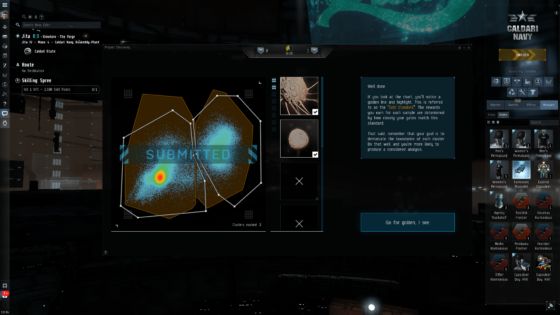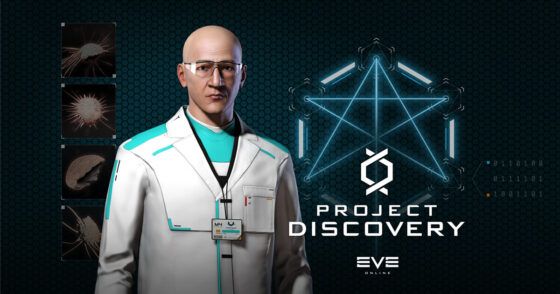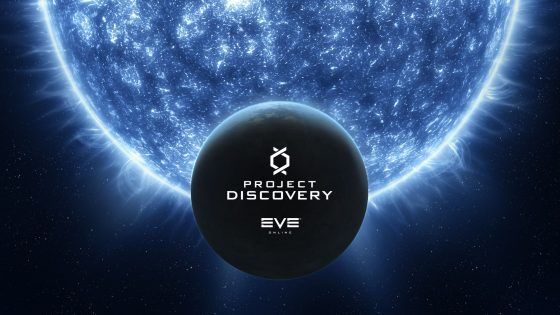Every month, our Head of Content Alex Sinclair Lack has the honour of talking with CCP’s Creative Director Bergur Finnbogason and CCP’s Brand Director Sæmundur Hermannsson. We discuss the goings on in New Eden as well as the behind-the-scenes scoop on the one-of-a-kind Icelandic studio at CCP. In this month's edition, in preparation for an extra special micro-series we'll soon be publishing on crowdsourced science in video games, we concentrated on the remarkable merits of Project Discovery. But that's not all, we also quizzed the team on feelgood gaming, friendship in video games, and the indie games that they just can't stop playing.
For our previous interview on the many changes and events in the Foundation Quadrant, click here or to read our full catalogue of EVE Online interviews, click here.
Alex: Congratulations on winning your Webby Award for Project Discovery. We’ve been talking with your partners at Massively Multiplayer Online Science for a unique upcoming feature. The altruistic benefits of Project Discovery are admirable and clear, but what have been the advantages for CCP from a more commercial perspective?
Bergur: We undoubtedly initially went into the project for altruistic reasons, but Project Discovery is enthralling from a game design point of view too. It’s a really fascinating problem to solve – to figure out how you can blend these two worlds together and give back. I’m a massive science buff and my wife is a geneticist so it’s something close to our hearts. Project Discovery gave rise to a multitude of fascinating challenges and opportunities to learn from something completely different.

Bergur (continued): It was wonderfully reassuring to see just how many players and media organizations were enamoured by it. Especially from the general non-gaming media, there has been a huge amount of interest and positive publicity. And that’s not to mention the hardcore scientific media; my wife was initially baffled when I told her we were going to be in Nature – pretty much the most prestigious scientific journal in the world – and then she was double baffled when she heard we were actually going to make the cover. Those covers are normally reserved for hyper-specific and inaccessibly boring topics for most people.
Sæmi: And it is a great image! It’s a good question on the commercial stuff. It’s less commercial and more marketing awareness, it’s generated a lot of exposure for us – brand awareness about the game – that obviously brings in new players. And moreover, it’s engagement for our current players. Project Discovery was perfect for a minigame so that’s how we positioned it. And from the players perspective, imagine playing a game and being able to say “Yes, through the game my friends and I are playing we’re helping to progress the search of exoplanets or mapping out the human protein atlas or helping to fight Covid.”
Bergur: There is amazing pride in the project amongst the players. It’s 100% the players that make it; if it weren’t for the players this project would never be and it’s a beautiful testament to something we always talk about – that we are just the janitors providing the tools for players to play in this sandbox. They take our tools and they make the beauty that is Project Discovery. There is a huge amount of pride in it amongst the players. They’re excited to talk about it and learn about it. When we introduce a new topic, you see a huge spike from our players on archive pages about these nuanced scientific topics that they’d probably never considered before.
Sæmi: And for us personally, this is one of the coolest projects we’ve ever gotten to work on. This was one of the first projects I got to work on at CCP, and I had dinner with Michel Mayor - how cool is that? Thirteen months later and he won the Nobel Prize. My only regret is not getting a photo with him.
Alex: The folks at MMOS had very kind words to say about CCP too. Specifically mentioning a panel where Michel Mayor and a CCP intern sat side-by-side answering questions as equals, and how that speaks wonders about CCP’s structure.
Bergur: There are so many great quotes from that panel, it could have been a movie. We asked him to give a keynote speech on exoplanets and so many people turned up. I think it was one of the only times someone managed to out-nerd the EVE community. There were like the brainiest people you’ve ever met in your whole life, and they went just completely blank – they couldn’t say anything after what was the most amazing PowerPoint presentation I’ve ever seen.

Sæmi: But the really funny thing was that if you flip it around, just how enthusiastic Michel Mayor was about the whole thing. He was giddy! It was so fun.
Bergur: He toured the office and one of our VFX artists was working on our new sun shader, and Michel asked, “What data and calculations are you using to simulate the suns?” And we were like, “Oh no, here it is, it’s just André, CCP Mikkel, doing his thing, being a nerd.” And Michel said “Hmm…interesting.” Then he turned to his communications officer and said something in French, they bickered for a little bit and then he turned backed to me and said “Hmmm…this is really interesting. This is much better than our calculations of how the sun looks.”
Alex: Amazing.
Bergur: And to this day whenever I get in an argument with André, he's still like “Yeah? Well, I made the best suns in the universe!”
Alex: It sounds like it’s safe to assume that Project Discovery is here for the long haul?
Bergur: I definitely hope so. The Covid-19 project that we’re working on now will continue for some time at least. It’s an incredibly important project and the data that’s coming out of it is going to be instrumental for years to come. Just as we’re learning now with Covid and the Delta variant, this isn’t over. This isn’t the last SARs that we will need to deal with. So, the work our players are doing right now is going to be useful going forward with the next iteration. The way we’re processing data is also very applicable to other viruses and immune diseases such as cancer and HIV. So this platform that we’ve built is very valuable for other reasons as well, and there is a real opportunity to scale it.

Bergur (continued): As for exactly how long we’ll continue the project or what we’ll choose for the next one, it’s not something we’re talking about right now. Covid is still very real, and this research is still very valid. I’m very proud and humbled by the effort that the community has put into this project, and I hope that we can continue to support and help.
Alex: We run a Feelgood Friday segment at MMOGames filled with positive news from the gaming industry, CCP and Project Discovery are very quickly monopolizing it. Another project that has recently featured is your Friendship in Video Games course with the University of Iceland. How did that come about?
Bergur: This is research that we started back in 2017 and it began with a very simple question: “Why in the world do players play EVE Online and why do they stick with it?” We have really strong long-term player retention with incredibly strong community bonds. We’ve had a lot of people getting married at fan fests thanks to EVE. It used to be say, Hilmar the CEO or employees, and now its players getting hitched with Max Singularity, the space-pope, bishop and actual player who is marrying people!
Bergur (continued): It’s all too easy to take it for granted that players have these strong connections, but really we had no idea why exactly players stuck around to this degree. So, we decided to find out. The natural evolution of this research kept directing us to friendships – how they form, what makes a good friendship, and how the game can influence them. It was an extremely humbling experience; we had to swallow many of the assumptions we’d made in the past about how New Eden was this ruthless world of backstabbing where people didn’t take no for an answer. Instead, we soon found out that 80% of EVE Online players look at themselves as helpers; they enjoy figuring out ways to help and support each other. Which really again crystallises in Project Discovery and the other altruistic projects we’ve launched. But we really got there by accident rather than trying to prove a point about EVE as a friendship-machine or anything like that.
Alex: We’ve got another feature we’ve started recently, Indie Spotlight, where we recommend the under-appreciated indie games that don’t get enough attention and I was wondering if there were any that…
Sæmi: TowerFall Ascension!
…inspired EVE Online?
Sæmi: Well I’m not sure about inspiring EVE Online but this is the indie game that I’ve played the most out of any of them. It’s a four-player 1v1 game of 2D pixel art. If you remember the good old days of playing four-controller splitscreen Nintendo 64 with your friends, it’s that feeling. It’s so good. It’s by a developer called Matt Makes Games. And I am the best in Iceland. Well…nobody has challenged me yet and if you say it often enough it becomes a fact, right?
Bergur: I’ve been playing an Icelandic game by ex-CCP crew at 1939 Games called Kards. It’s a World War II card game, with lots of tanks and awesome stuff. It’s a really cool, fun game and I’m definitely going to use this as a shameless plug to promote my ex-CCPers. They’re doing a pretty kickass job and it’s improving loads all the time.
We run these monthly EVE Online interviews regularly; readers can find them by searching via topic or by browsing the full catalogue. MMOGames.com is committed to bringing you all the freshest, funniest, and most insightful MMO news. If you enjoyed this content, why not share it with your community? And make sure that you never miss our updates and exclusive giveaways by following and favouriting us on Instagram, Twitter, and Facebook.